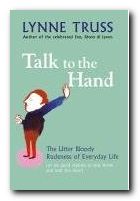The Utter Bloody Rudeness of Everyday Life (or six good reasons to stay home and bolt the door)
Lynne Truss must surely be one of the next participants lined up ready for the TV show Grumpy Old Women – in which celebrity ladies of a certain age ventilate their pet grievances. First she was grumpy about failures of punctuation in Eats, Shoots & Leaves, and now in Talk to the Hand she is being grumpy about modern manners – or lack of them. Fortunately, her grumpiness is served up with generous helpings of witty exposition, well dramatised anecdote, and self-deprecating humour.
 She rails against people who don’t say ‘Thank you’ when you hold open a door for them – but goes further by analysing the reasons for our social expectations and our reactions to them when thwarted. The same is true for people who let their children run amok in other people’s houses – and are affronted if you don’t share share their self-indulgent view of them.
She rails against people who don’t say ‘Thank you’ when you hold open a door for them – but goes further by analysing the reasons for our social expectations and our reactions to them when thwarted. The same is true for people who let their children run amok in other people’s houses – and are affronted if you don’t share share their self-indulgent view of them.
Fortunately, her own expectations in righting these situations are self-limited:
This book has quite a modest double aim: first, to mourn, without much mature perspective or academic rigour, the apparent collapse of civility in all areas of our dealings with strangers; then to locate a tiny flame of hope in the rubble and fan it madly with a big hat.
She’s against being prescriptive or proscriptive, and has a basic position that can be summed up as “Remember you are with other people; show some consideration.” Her chief bêtes noirs are (fairly predictably) automated telephone call services, shop assistants who don’t pay attention, and most things to do with information technology (‘There’s a WEBSITE for people with INTERNET ADDICTION’ [!])
Strangely enough, she is quite tolerant of people using mobile phones in public places and saying asinine things such as “I’m on the train. We’re just leaving Euston/Manchester/Bristol”. But I was glad to see that she secretly wished physical pain (as I do) to kids who skateboard or cycle on the pavement.
She’s good at cataloguing the language of insolence and contempt in sloppy service expressions – as when the waiter plonks down your main course with “There you go” and when you say “Thank you” replies with “No problems”.
She’s at her weakest when she makes the case for respect, and takes the Armistice Day memorial service as an example which ought to tug at all of our emotional coat tails. But she has lost none of her skill for switching deftly into the persona of the person she’s writing about – conjuring up their vocabulary and tone of voice with her well-attuned ear for speech and language patterns.
Of course what constitutes good manners changes with time. Nobody but a complete oaf would spit in public these days – yet I can remember when “No spitting” was a standard injunction on all public transport, even after the war. The second world war, that is.
© Roy Johnson 2009
Lynne Truss, Talk to the Hand, London: Profile Books, 2006, pp.240, ISBN: 1861979797
More on lifestyle
More on biography
More on the Bloomsbury Group